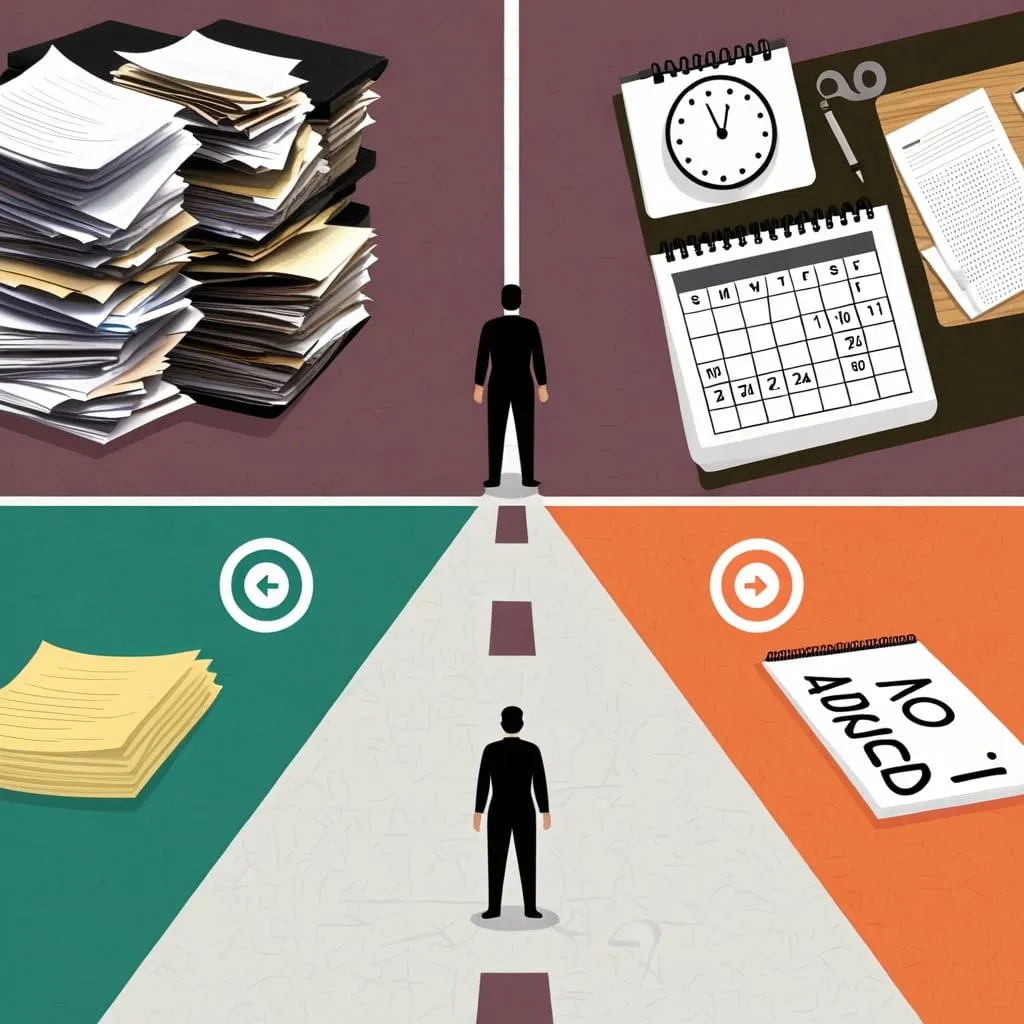Breaking Big Tasks into Bite-Sized Pieces: The Power of Micro-Goals
Ever feel like you're drowning in a sea of endless to-dos? We've all been there. That's where micro-goals come in to save the day. These little nuggets of achievement are like secret weapons for getting stuff done, especially when it comes to money matters.
Think about it. You wouldn't try to eat an entire pizza in one bite, right? Same goes for tackling big goals. Breaking them down into smaller, manageable chunks makes them way less intimidating and way more doable.
Let's dive into how micro-goals can supercharge your productivity and help you crush those financial dreams.
The Magic of Micro-Goals
Imagine you're trying to save up a cool $10,000 this year. Sounds pretty daunting, huh? But what if we break it down to saving $200 a month or even $50 a week? Suddenly, it doesn't seem so impossible. That's the beauty of micro-goals - they make the impossible possible.
These tiny targets are like stepping stones across a river. Each one gets you a little bit closer to the other side, and before you know it, you've made it across without even getting your feet wet.
Micro-goals aren't just about making big tasks more manageable. They're also incredibly motivating. Every time you tick off one of these mini-milestones, you get a little burst of accomplishment. It's like a pat on the back from yourself, saying "Hey, good job! You're making progress!"
Clarity is Key
When you're faced with a massive goal, it's easy to feel lost and unsure where to start. Micro-goals act like a GPS, giving you clear directions on where to go next.
Let's say you want to boost your financial know-how. Instead of just saying "I want to learn about money," you could set micro-goals like reading a chapter of a finance book each week, or watching one educational video a day. These specific, actionable steps give you a clear path forward.
This approach is great for teams too. When everyone knows exactly what they need to do, it's much easier to work together towards a common goal. Plus, it takes a lot of the stress out of the equation. Instead of worrying about some far-off finish line, you can focus on the next small step right in front of you.
Seeing is Believing
One of the coolest things about micro-goals is that they let you see your progress in real-time. It's like watching a loading bar fill up bit by bit. Each micro-goal you complete is another chunk of that bar filled in.
This visual progress is super important when it comes to staying motivated. Let's say you're trying to pay off debt. Every time you make a payment and see that balance go down, even by a little bit, it's a concrete reminder that you're moving in the right direction. It's way more satisfying than just working towards some vague, distant goal.
Putting Micro-Goals into Action
So, how do you start using micro-goals to tackle your big tasks? Here's a simple game plan:
Break It Down First things first, take your big goal and chop it up into smaller, bite-sized pieces. These should be specific tasks that you can complete in a relatively short time. If you're starting a side hustle, for example, your micro-goals might include things like brainstorming business ideas, creating a basic business plan, and setting up a simple website.
Get Organized Once you've got your list of micro-goals, it's time to put them in order. Some tasks might need to be done before others, so think about the most logical sequence. It's like putting together a puzzle - you want to make sure all the pieces fit together smoothly.
Hold Yourself Accountable Set deadlines for each of your micro-goals. This helps keep you on track and gives you a sense of urgency. It can also be helpful to share your goals with someone else. Having a friend or family member check in on your progress can be a great motivator.
Celebrate Your Wins Don't forget to pat yourself on the back when you complete a micro-goal! It doesn't have to be anything big - maybe treat yourself to your favorite coffee or take a relaxing bath. The important thing is to acknowledge your progress and give yourself a little boost of motivation for the next task.
Micro-Goals and Your Money
When it comes to finances, micro-goals can be incredibly powerful. They help you make small changes that add up to big results over time. Here are a few examples:
Weekly Spending: Instead of just saying "I want to save money," set a micro-goal to cut back on one small expense each week. Maybe it's skipping that fancy coffee once a week or bringing lunch from home one extra day. These small changes can add up to significant savings over time.
Time Management: If you struggle with managing your time (which can definitely impact your finances), set micro-goals to help you stay on track. For example, you might aim to limit your social media time to 30 minutes a day and use that extra time to research investment options or work on a side hustle.
Debt Repayment: If you're tackling debt, your micro-goals might include paying off a certain amount each week or finding one way to reduce your expenses each month. Seeing that debt number go down, even by a little bit, can be incredibly motivating.
The Psychology of Micro-Goals
Micro-goals aren't just practical - they're also a psychological powerhouse. Here's why they work so well:
Sense of Accomplishment: Every time you complete a micro-goal, you get a little hit of dopamine - the feel-good chemical in your brain. This creates a positive feedback loop that keeps you motivated to keep going.
Increased Motivation: Having clear, achievable targets to work towards keeps you engaged and focused. It's like having a series of small finish lines to cross instead of one big marathon.
Boosted Self-Esteem: As you tick off those micro-goals, you start to see yourself as someone who gets things done. This can boost your confidence and make you more likely to take on bigger challenges in the future.
Celebrating Your Wins
Don't underestimate the power of celebration! Taking a moment to acknowledge your achievements, no matter how small, can be a huge motivator. It's like giving yourself a high-five for a job well done.
When you celebrate your micro-goals, you're reinforcing positive behaviors and keeping yourself motivated for the next task. It doesn't have to be anything big - maybe it's just taking a moment to feel proud of yourself or sharing your success with a friend.
Real-Life Examples
Let's look at how micro-goals might play out in some real-life financial scenarios:
Saving for a Big Purchase: Say you're saving up for a new car. Your micro-goals might include setting aside a certain amount each week, researching ways to cut back on expenses, or looking for opportunities to earn extra income.
Paying Off Debt: If you're tackling debt, your micro-goals could include making an extra payment each month, even if it's small, or finding one unnecessary expense to cut out each week.
Getting Started with Investing: For someone new to investing, micro-goals might include learning about one new investment concept each week, setting up a brokerage account, or investing a small amount each month to get comfortable with the process.
Wrapping It Up
Micro-goals are like secret weapons for getting stuff done. They take big, scary tasks and turn them into manageable, bite-sized pieces. By breaking things down, staying focused, and celebrating your progress along the way, you can tackle even the most daunting financial goals.
Remember, every big achievement is really just a series of smaller accomplishments strung together. So the next time you're feeling overwhelmed by a big task, try breaking it down into micro-goals. You might be surprised at how quickly you start making progress.
In the world of finance, where big numbers and long-term goals can feel overwhelming, micro-goals can be a game-changer. They give you a clear path forward, help you stay motivated, and let you see your progress in real-time. So why not give it a try? Start small, celebrate often, and watch as those micro-goals add up to big wins in your financial life.






